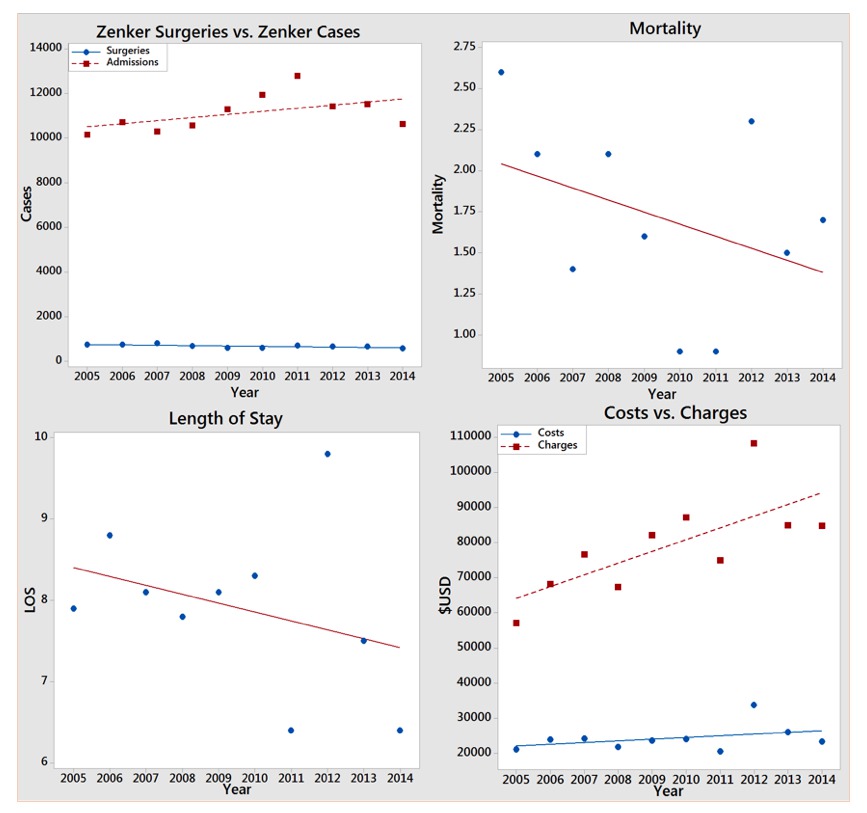
|
ZENKER's DIVERTICULECTOMY IN THE UNITED STATES: A DECADE OF OUTCOMES Paul T. Kroner*, Mohammad Afsh, Bhaumik Brahmbhatt, Juan E. Corral, Frank Lukens, Timothy A. Woodward Gastroenterology, Mayo Clinic Florida, Jacksonville, FL Background Management Zenker's diverticulum consists of endoscopic or open surgical myotomy, which has dramatically progressed in the past decade. To date, no national study has examined the trend in Zenker's diverticulectomy procedure volumes or outcomes relating to hospital factors. The aim of this study was to explore the trend in Zenker's diverticulectomy volume, mortality and other outcomes relating to teaching status, location, hospital size and economic impact in the past decade in the US using a national database. Methods Retrospective cohort study using the NIS from 2005 to 2014, an inpatient dataset including over 350 million US hospital admissions. All patients with an ICD-9CM code for Zenker's diverticulectomy were included. None were excluded. The primary outcome was the trend in mean diverticulectomy volumes. Secondary outcomes were trends in inpatient mortality, length of hospital stay (LOS), total hospital charges and costs (adjusted for inflation with the Consumer-Price Index). Multivariate analysis was used to adjust for age, sex, race, median income in the patient's zip code, Charlson Comorbidity Index, hospital region, rural location, size and teaching status. Results 6,490 open diverticulectomies were performed in the past decade. Trends are shown on Figure 1. The mean age was 68 years and 48% were female. Outcomes and trends are shown on Table 1 and Figure 1, respectively. The total number of procedures decreased from 742 in 2005 to 580 in 2014 (p=0.04), although upon correcting for confounders no difference in odds of diverticulectomy was noted comparing patients in 2014 to patients in 2005. Inpatient mortality changed from 0.6% in 2005 to 1.7% in 2014, although not at a statistically significant level (p=0.19), which was confirmed on multivariate analysis. Hospital LOS decreased from 8.0 days in 2005 to 6.4 days in 2014 (p=0.05), which was also confirmed on multivariate analysis (Adj. Mean:-2.8days,p=0.04). Costs of hospitalization did not significantly change, while total charges significantly increased. Conclusion The total number of open diverticulectomies has decreased over the past decade, potentially reflecting a shift from the rigid surgical approach to a flexible endoscopic one. The overall in-hospital mortality for this procedure has not varied in the past decade and remains at 1.7% in 2014. The outcomes in teaching hospitals are statistically better including lower mortality and shorter length of hospital stay. Urban and large hospitals also had lower mortality and shorter stays, but this may have been cofounded by the location and size of teaching hospitals in those areas. Although costs remained essentially unchanged, total hospitalization charges have increased significantly, a trend that is observed across most medical conditions and is attributed to changing insurance models and policies. Table 1
Table 1 - Crude and adjusted (yearly incremental) values for Mortality, Length of Stay, Total Hospitalization Charges and Hospital costs in patients who underwent Zenker's diverticulectomy in the past decade, stratified by hospital teaching status and hospital size. 
Figure 1 - Total number of Zenker's diverticulectomies, Mortality, length of stay (LOS), total hospitalization charges and hospital cost trends during the past decade for patients who underwent Zenker's diverticulectomy during the past decade. Back to 2018 Posters |
|||||||||||||||||||||||||||||||||||||||||||||||||||||||
© 2026 Society for Surgery of the Alimentary Tract. All Rights Reserved. Read the Privacy Policy.